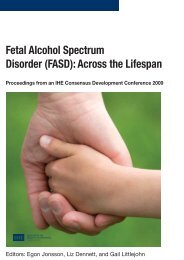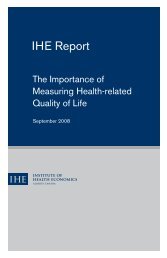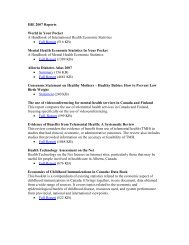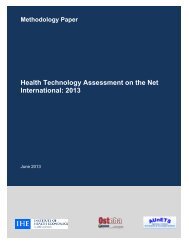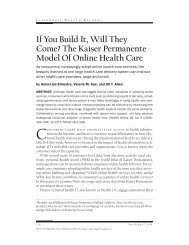lack <strong>of</strong> <strong>for</strong>mal training in nutrition, exercise, behavioural counseling, and counseling on<strong>obesity</strong> and related topics;perceived inability to change patient behavior;lack <strong>of</strong> known long-term effectiveness <strong>of</strong> bariatric <strong>treatments</strong>;negative attitudes toward obese patients;lack <strong>of</strong> recognition/acceptance <strong>of</strong> <strong>obesity</strong> as a disease;the belief that obese individuals are not interested in or ready <strong>for</strong> weight loss and bariatrictreatment and/or the belief that <strong>obesity</strong> is the responsibility <strong>of</strong> the affected individual;lack <strong>of</strong> time during patient visits; lack <strong>of</strong> knowledge about available bariatric treatment services. 1,5,8,14,18,31,48,67,79,90,145,147-150,153Most commonly cited system-level barriers include:the lack <strong>of</strong> resources to support multidisciplinary weight management programs <strong>for</strong> <strong>adult</strong><strong>obesity</strong> within the current environment <strong>of</strong> cost containment;the lack <strong>of</strong> available teaching materials <strong>for</strong> individuals with <strong>obesity</strong>;the lack <strong>of</strong> infrastructure support/places to which to refer patients; limited insurance coverage (public and private) <strong>for</strong> weight managementinterventions. 1,31,48,79,90,145,147,150 In Canada, <strong>for</strong> example, counseling services <strong>of</strong>fered bydietitians and physical-activity specialists are not considered medically necessary and are notcovered as part <strong>of</strong> provincial health plans. 31Considering the growing prevalence <strong>of</strong> <strong>obesity</strong> in Canada, it has been suggested that the majority <strong>of</strong>individuals with <strong>obesity</strong> should be managed by primary care providers. 8,31 Primary care physicianscan play a variety <strong>of</strong> roles, from treating individuals with <strong>obesity</strong> directly <strong>for</strong> weight loss orprevention <strong>of</strong> weight gain and providing care <strong>for</strong> <strong>obesity</strong>-related comorbidities, to referring patientsto appropriate weight management programs. 154 However, evidence suggests that <strong>obesity</strong> tends to beneglected in primary care and that many <strong>adult</strong>s with <strong>obesity</strong> are not even getting lifestylemodification advice from a healthcare pr<strong>of</strong>essional. 1,5,8,146-151,153,155 The various causes <strong>for</strong> this includethe time limitations <strong>of</strong> an <strong>of</strong>fice visit, attention paid to other immediate healthcare issues, lack <strong>of</strong>reimbursement <strong>for</strong> providing treatment and additional counseling, inadequate skills and training,physicians’ skepticism about health promotion, and lack <strong>of</strong> resources <strong>for</strong> referral. Moreover,physicians may be unaware <strong>of</strong> the tools necessary to diagnose <strong>obesity</strong>. 5,146,150Management <strong>of</strong> <strong>adult</strong> <strong>obesity</strong> and ethicsEthical concerns raised by the increasing prevalence <strong>of</strong> <strong>obesity</strong> and the treatment <strong>of</strong> individuals with<strong>obesity</strong> include:the question <strong>of</strong> whose responsibility it is and <strong>of</strong> whether bariatric treatment is accuratelydescribed as therapy or as research, given its low percentage <strong>of</strong> long-term success;the need <strong>for</strong> standardized disclosure <strong>of</strong> the possibility <strong>of</strong> harm versus the low probability <strong>of</strong>benefit;<strong>Bariatric</strong> <strong>treatments</strong> <strong>for</strong> <strong>adult</strong> <strong>obesity</strong> 30
the status <strong>of</strong> voluntary and in<strong>for</strong>med consent as a meaningful model <strong>of</strong> patient cooperationin treatment;the issues raised by the difference in quality <strong>of</strong> care that is provided <strong>for</strong> people with <strong>obesity</strong>; the policy issues raised by the absence <strong>of</strong> uni<strong>for</strong>m standards <strong>for</strong> and regulatory oversight <strong>of</strong>weight management programs. 60,107,138,148,156-159Some <strong>of</strong> the ethical questions arise when healthcare providers are confronted by an individual with<strong>obesity</strong>, and they may harbor a bias against <strong>obesity</strong> and its effects on the health <strong>of</strong> affectedindividuals. 60,107,138,148,156-158 The healthcare providers involved in <strong>obesity</strong> management have the ethicalresponsibility to know and understand their motives, beliefs, attitudes, and feelings regarding <strong>obesity</strong>,overeating, physical activity, and health. 107,157,158 Failure to understand and acknowledge these thingsincreases the risk that they will act unethically by unintentionally imposing personal values. Providersalso have the ethical responsibility to identify and respond appropriately to a particular individual’sneeds and to sincerely/objectively in<strong>for</strong>m the individual about what skills they have to <strong>of</strong>fer andwhether or not they have the ability to cater appropriately to the individual’s needs.Ethical problems surrounding <strong>obesity</strong> and its management have an impact in many societal arenas,including socioeconomic environments, the educational system, science, law, andgovernment. 60,107,138,148,156-159 The variability among individuals with <strong>obesity</strong> and the complexity <strong>of</strong>factors that cause an individual to seek <strong>obesity</strong> management suggest that there can be no standardset <strong>of</strong> rules <strong>for</strong> ethical decision-making. A new ethical decision needs to be made with each newrequest <strong>for</strong> help and, frequently, these decisions need to be made on the spot, without theopportunity <strong>of</strong> seeking expert advice. There is a need <strong>for</strong> a general framework <strong>for</strong> ethical decisionmaking,considering four domains (the healthcare provider, the client, the treatment resourcesavailable, and the social context) and the interplay <strong>of</strong> these four domains.Demand <strong>for</strong>, access to, and utilization <strong>of</strong> bariatric <strong>treatments</strong>The literature search conducted <strong>for</strong> this review did not retrieve in<strong>for</strong>mation on the demand <strong>for</strong>,access to, coverage <strong>for</strong>, or utilization <strong>of</strong> currently available non-surgical bariatric <strong>treatments</strong> inCanada. Neither did the literature search yield in<strong>for</strong>mation on who receives bariatric medication <strong>for</strong><strong>adult</strong> <strong>obesity</strong> in Canada and on how such access varies by individual characteristics. The literatureretrieved <strong>for</strong> this review did not provide in<strong>for</strong>mation on regional variations in the provision <strong>of</strong> any<strong>of</strong> the non-surgical bariatric <strong>treatments</strong> currently available in Canada.Cawley and Rizzo 160 reported on the utilization <strong>of</strong> weight management medications in the US usingdata from the Medical Expenditure Panel Survey <strong>for</strong> 1996–2002. Their results pointed to widesociodemographic disparities in bariatric drug use. Women were almost 20% more likely than mento use bariatric drugs and Hispanics and African-American individuals were only 39% as likely asWhites to use them. The probability <strong>of</strong> using weight management drugs decreased significantly <strong>for</strong>persons older than age 65. Prescription drug coverage was strongly correlated with utilization <strong>of</strong>pharmacotherapy. Those with prescription drug coverage were 46% more likely to use bariatricdrugs. Use was also correlated with education. No correlation was found between income and use <strong>of</strong>bariatric drugs.Cawley and Rizzo 160 found that the vast majority <strong>of</strong> obese individuals who met the criteria <strong>for</strong>bariatric drugs were not taking them, and a significant number <strong>of</strong> those who did not meet themedical criteria were taking them. <strong>Bariatric</strong> drug users who did not meet the medical criteria were<strong>Bariatric</strong> <strong>treatments</strong> <strong>for</strong> <strong>adult</strong> <strong>obesity</strong> 31
- Page 1 and 2:
Alberta STE ReportBariatric treatme
- Page 3 and 4: Alberta STE ReportBariatric treatme
- Page 5 and 6: EXECUTIVE SUMMARYSocial and System
- Page 7 and 8: Three surgical procedures—adjusta
- Page 9: Costs of Bariatric Surgery and Pote
- Page 12 and 13: Regulatory status .................
- Page 14 and 15: TABLES AND FIGURESSection One: Soci
- Page 16 and 17: ABBREVIATIONSAll abbreviations that
- Page 18 and 19: LYMmMAMDMUHCNANHLBINHSNICENIHNNHNPH
- Page 20 and 21: Bariatric physician: a licensed Doc
- Page 22 and 23: High-density lipoprotein (HDL): a f
- Page 24 and 25: Very-low-calorie diet (VLCD): a die
- Page 26 and 27: Additional Internet searches were c
- Page 28 and 29: This report addresses obesity in ad
- Page 30 and 31: Many systemic factors have been ide
- Page 32 and 33: Severe obesity is associated with d
- Page 34 and 35: eport their height and under-report
- Page 36 and 37: Also using self-reported data from
- Page 38 and 39: An examination of overall obesity d
- Page 40 and 41: Table S.2 presents the associationa
- Page 42 and 43: • have multiple focal points and
- Page 45 and 46: The main problem in any weight mana
- Page 47: food, and a negative body image. As
- Page 50 and 51: directly causes death. 61 To the ex
- Page 52 and 53: The addition of a selected pharmaco
- Page 56 and 57: slightly more likely to have prescr
- Page 58 and 59: selection criteria, have facilities
- Page 60 and 61: Barriers to using appropriate baria
- Page 62 and 63: Overview of adult obesityOver the p
- Page 64 and 65: the need for regular physical activ
- Page 66 and 67: phenylpropanolamine/25. Sibutramine
- Page 68 and 69: Complianceand AdherenceDemand andut
- Page 70 and 71: Aetna Clinical PolicyBulletinswww.a
- Page 72 and 73: Overweight 123,821 172,971 157,623
- Page 74 and 75: REFERENCES1. 2006 Canadian clinical
- Page 76 and 77: 34. Gostin LO. Fast and supersized:
- Page 78 and 79: 69. Klarenbach S, Padwal R, Wiebe N
- Page 80 and 81: 105. Hill JO, Thompson H, Wyatt H.
- Page 82 and 83: 141. Ross R, Bradshaw AJ. The futur
- Page 84 and 85: 172. Arkinson J, Ji H, Fallah S, Pe
- Page 86 and 87: This section will address a set of
- Page 88 and 89: dietary therapy is to reduce total
- Page 90 and 91: Additional benefits of exercise ove
- Page 92 and 93: medications that inhibit intestinal
- Page 94 and 95: Rimonabant may be considered for pa
- Page 96 and 97: Long-term complications are specifi
- Page 98 and 99: Devices used for bariatric surgeryH
- Page 100 and 101: Description of the Included Systema
- Page 102 and 103: AEs for sibutramineAs compared to a
- Page 104 and 105:
Evidence on Efficacy/EffectivenessW
- Page 106 and 107:
Table T.7: Effects of behavioural t
- Page 108 and 109:
SurgeryDescription of the included
- Page 110 and 111:
follow-up time was 3 years. Results
- Page 112 and 113:
group as compared to the VBG group.
- Page 114 and 115:
The authors identified many methodo
- Page 116 and 117:
The investigators pointed out that
- Page 118 and 119:
approximately 3 to 5 kilograms. For
- Page 120 and 121:
for studies with a mean age of part
- Page 122 and 123:
Examining whether use of any of the
- Page 124 and 125:
Evidence from placebo-controlled cl
- Page 126 and 127:
colorectal or gastroesophageal or f
- Page 128 and 129:
Web of ScienceISI Interface License
- Page 130 and 131:
AMA Clinical PracticeGuidelineswww.
- Page 132 and 133:
critical appraisal of the included
- Page 134 and 135:
APPENDIX T.B: EXCLUDED STUDIESTable
- Page 136 and 137:
Padwal R, Li SK, Lau DC. Long-term
- Page 138 and 139:
Quality subsection 1: At least MEDL
- Page 140 and 141:
Quality subsection 5a:Study quality
- Page 142 and 143:
Partially reported: The study types
- Page 144 and 145:
Table T.C.1: Results of quality ass
- Page 146 and 147:
Table T.C.1: Results of quality ass
- Page 148 and 149:
APPENDIX T.D: CHARACTERISTICS OF SY
- Page 150 and 151:
Table T.D.1: Characteristics of the
- Page 152 and 153:
Table T.D.1: Characteristics of the
- Page 154 and 155:
Table T.D.2: Characteristics of the
- Page 156 and 157:
APPENDIX T.E: EVIDENCE TABLE ON SAF
- Page 158 and 159:
Serious surgical complicationsSurgi
- Page 160 and 161:
LSGmMAMDNAnssORQoLRCTRDRRRYGBSBPTGV
- Page 162 and 163:
Table T.F.1-2: Weight loss - Behavi
- Page 164 and 165:
Table T.F.1-4: Weight loss - Surger
- Page 166 and 167:
Table T.F.2: Quality of life (QoL)
- Page 168 and 169:
Curioni & Lourenco 2005 58Cholester
- Page 170 and 171:
Table T.F.3-3: Risk factors/comorbi
- Page 172 and 173:
Table T.F.3-5: Long-term effects of
- Page 174 and 175:
Maciejewski et al., 2005 65Avenell
- Page 176 and 177:
Table T.G.2: Effects of bariatric s
- Page 178 and 179:
Table T.G.4: Effects of bariatric s
- Page 180 and 181:
18. Cerulli J, Lomaestro BM, Malone
- Page 182 and 183:
50. Health Canada Drug Product Data
- Page 184 and 185:
SECTION THREE: ECONOMIC EVALUATIONC
- Page 186 and 187:
Definition of bariatric surgical pa
- Page 188 and 189:
etween surgical interventions, the
- Page 190 and 191:
concluded that adding orlistat to L
- Page 192 and 193:
Weight management program (WMP) ver
- Page 194 and 195:
groups. Compared with standard care
- Page 196 and 197:
Results from Analysis of Provincial
- Page 198 and 199:
DiscussionThe objectives of the eco
- Page 200 and 201:
surgical suites, and so on. The bud
- Page 202 and 203:
APPENDIX E.A: LITERATURE SEARCH SUM
- Page 204 and 205:
CRD Databases(DARE, HTA & NHS EED)h
- Page 206 and 207:
Web of ScienceISI Interface License
- Page 208 and 209:
NEOS Librarywww.library.ualberta.ca
- Page 210 and 211:
Table E.A.2: Evidence table of revi
- Page 212 and 213:
ResultHealth outcomesCostsMarginal
- Page 214 and 215:
CostsMarginal analysisThe cost anal
- Page 216 and 217:
Time Horizon/discount rateCurrency/
- Page 218 and 219:
Objectivestudy perspective: society
- Page 220 and 221:
ResultHealth outcomesCostsMarginal
- Page 222 and 223:
ResultHealth outcomesCostsMarginal
- Page 224 and 225:
S4Economic burden of obesityMean co
- Page 226 and 227:
15. Lacey LA, Wolf A, O'shea D, Ern
- Page 228 and 229:
Author Contribution StatementsPaula





